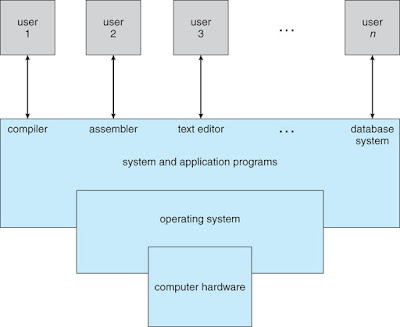Operating System And Properties
Operating system:-
An operating system is
an important components of computer system which controls all other components
of the computer system. Major components of a Computer System are-
1.
The Hardware
2.
The Operating System
3.
The application Program
Routine (e.g compiler, linkers, database management system, utility programs)
4.
The Human-ware (users)
Definition of Operating
system-
An Operating system is a
program, which acts as an interface between a user and all hardware (all
computer resources)
 |
| System Components |
Roles of Operating System-
The Operating system
provides the certain services to program and the users of the program. Some
common services provided by OS can be listed as follow-
1.
Program Execution
2.
Handling Input/Output
Operation
3.
Manipulation of file
system
4.
Error detection and
handling
5.
Resource allocation
6.
Accounting
7.
Information and
Resources Protection
1. Program
Execution-
The Operating System is
responsible for executing various programs whether users programs or system
program i.e, special programs required for matching functioning.
2. Handling Input/Output
Operation-
The Operating System is
responsible for handling various types of inputs (e.g, input from from
keyboards, inputs from mouse etc.) and various types of outputs in the
appropriate manner.
For instance, if the
input is coming from mouse, then it requires different type of handling as
compared to input coming from keyboard. Similarly, if an output is targeted for
printer, then it requires different type of handling as compared to output
targeted for monitor.
3. Manipulation of File
System-
This task involves the
making of decisions regarding the storage of files i.e, where (whether on
floppy disk or on hard disk etc.) and how a particular file is to be stored.
4. Errors Detection and Handling-
The Operating system is
also responsible for detecting any types of error that occurs and then properly
handling it.
5.Resource Allocation-
This task aims at proper
use of resources available. For example, if multiples files are to be
printed then "how and which order this task will take place?" Will be
decided by the operating system..
6.Accounting-
The operating system
keeps an account of what type of functioning is taking place and what type of
errors have occurred.
7.Information and Resource Protection-
The operating system is
responsible for ensuring that the information and resources available on
machine are used in the correct way. The operating system foils the
attempts to use them incorrectly.
All these services are
ensured by the functions provided by an operating system. The functions offered
by different operating systems differ from one operating system to another, but
more or less they provide the same services. These OS (Operating System)
functions are offered for the convenience of the programmer, to make the
programming task easier.
An operating system has
two parts : Kernel and Shell. The kernel is responsible for interacting with
hardware and the Shell is responsible for interacting with user. The Shell acts
as the command interpreter which takes the command from the user,
interprets them and take action accordingly.
GUI ( Graphical User
Interface) based operating systems has Shells that offer graphical elements for
interaction .






Osm work keep it up
ReplyDeleteGood job
ReplyDeleteN8ce
ReplyDelete